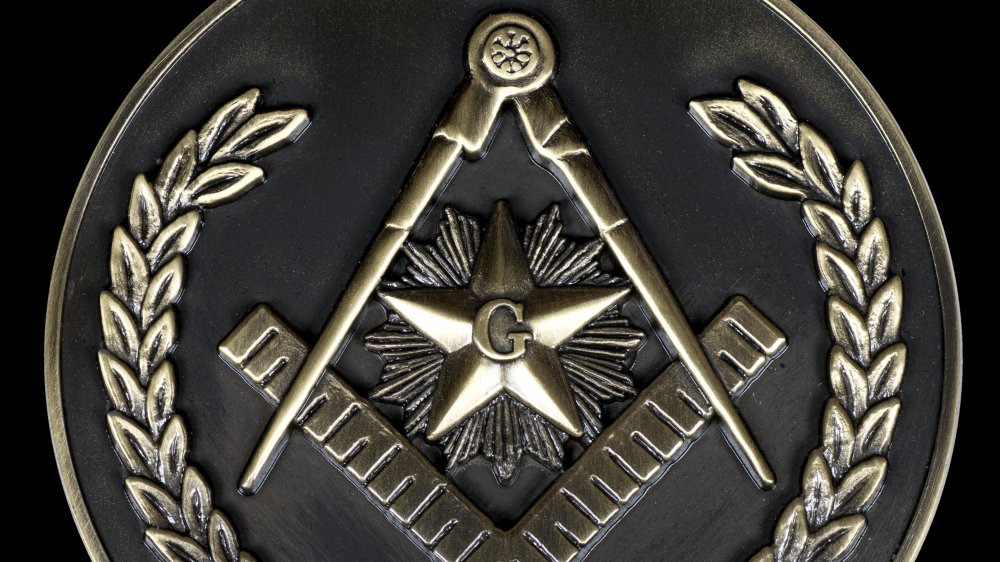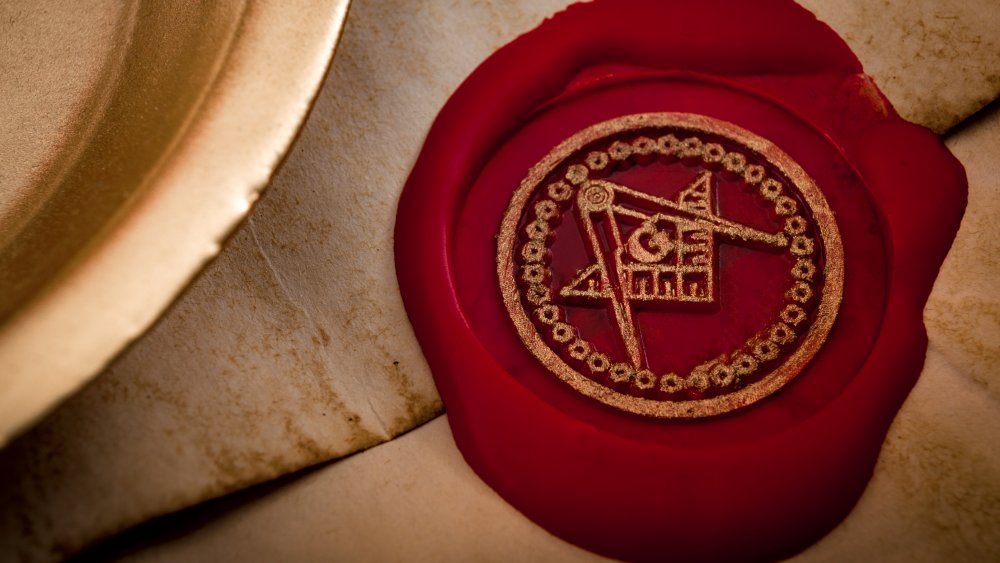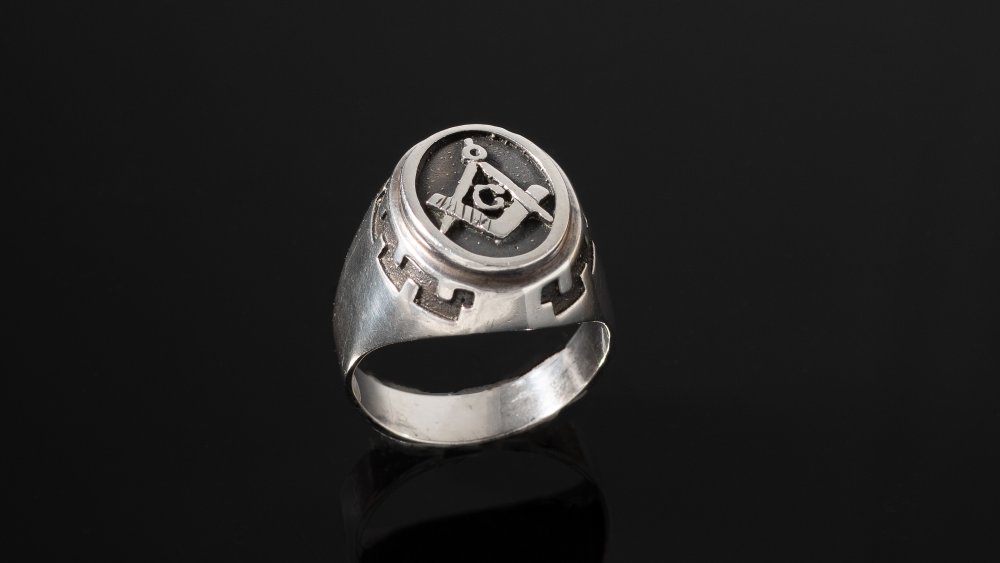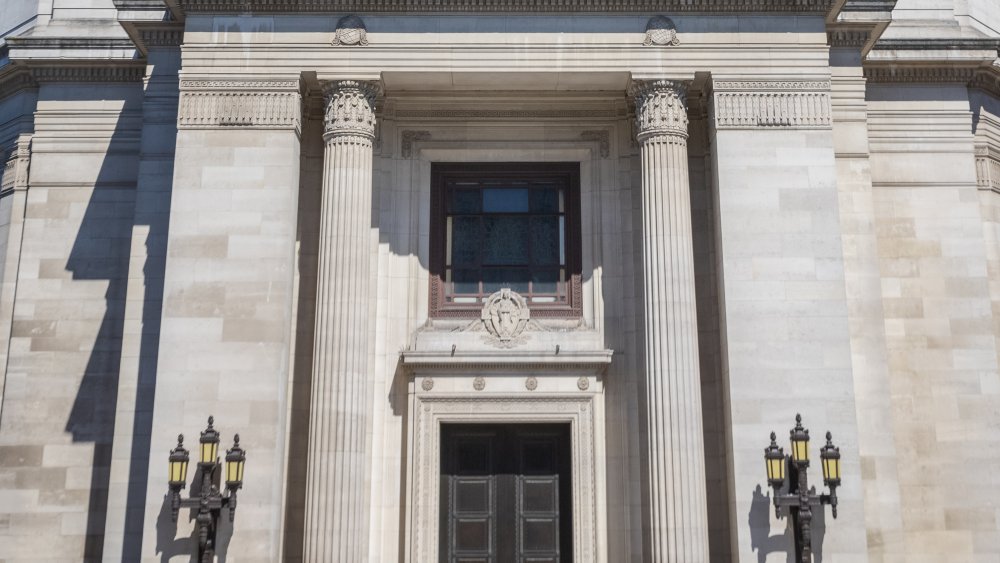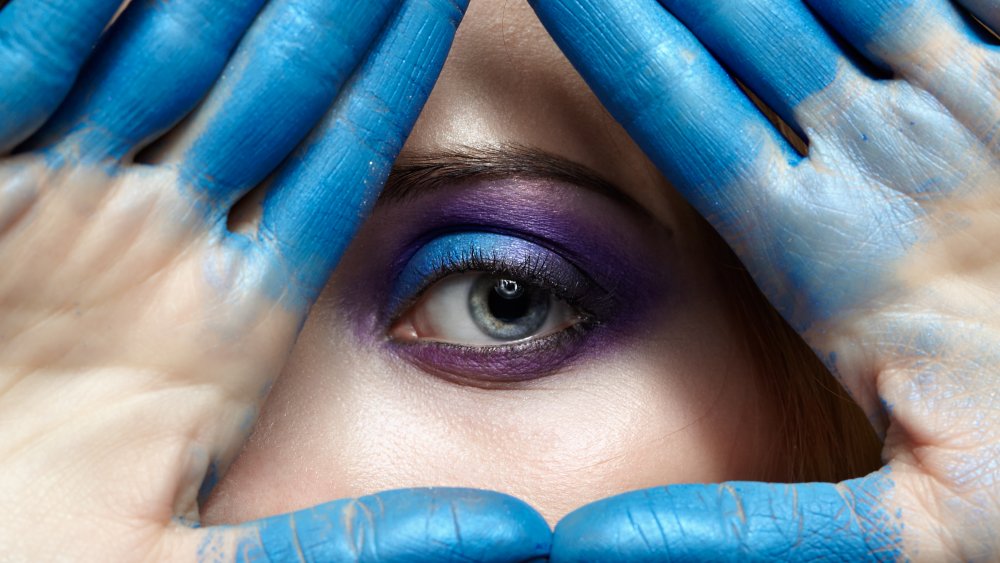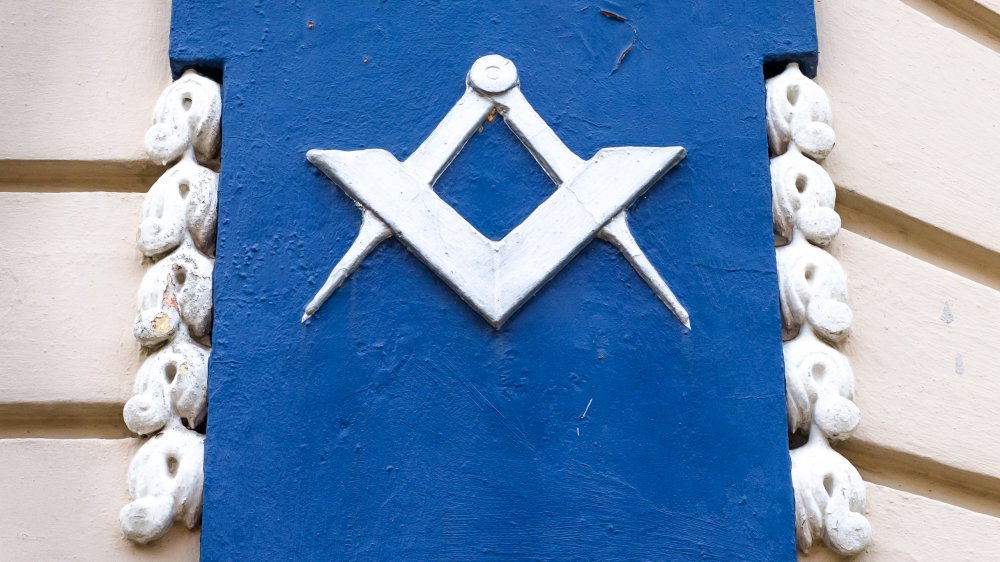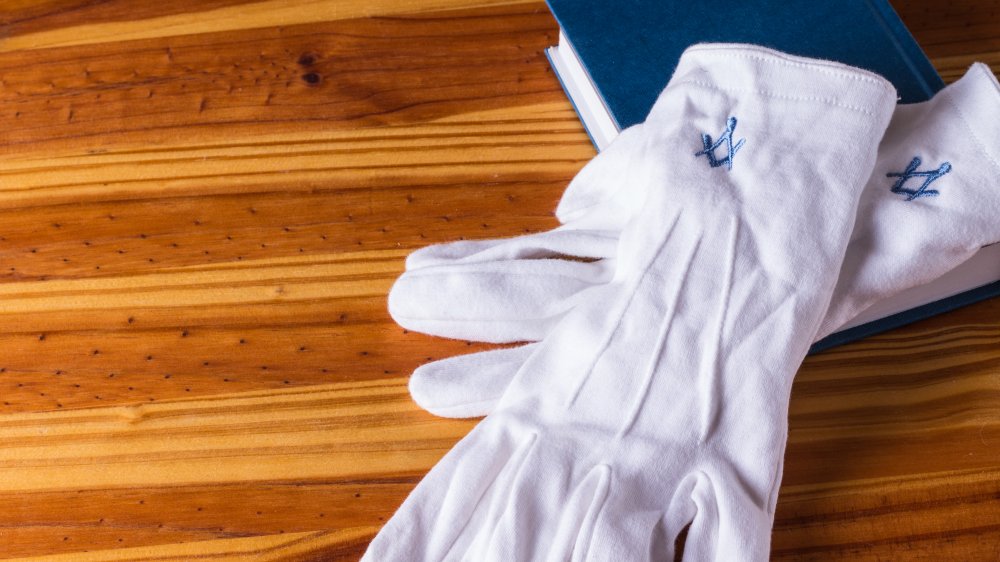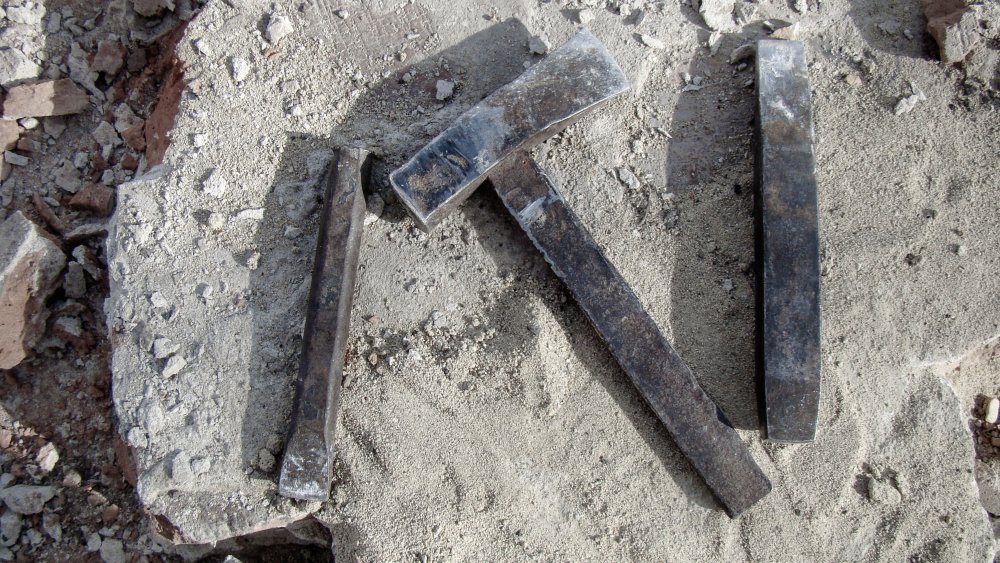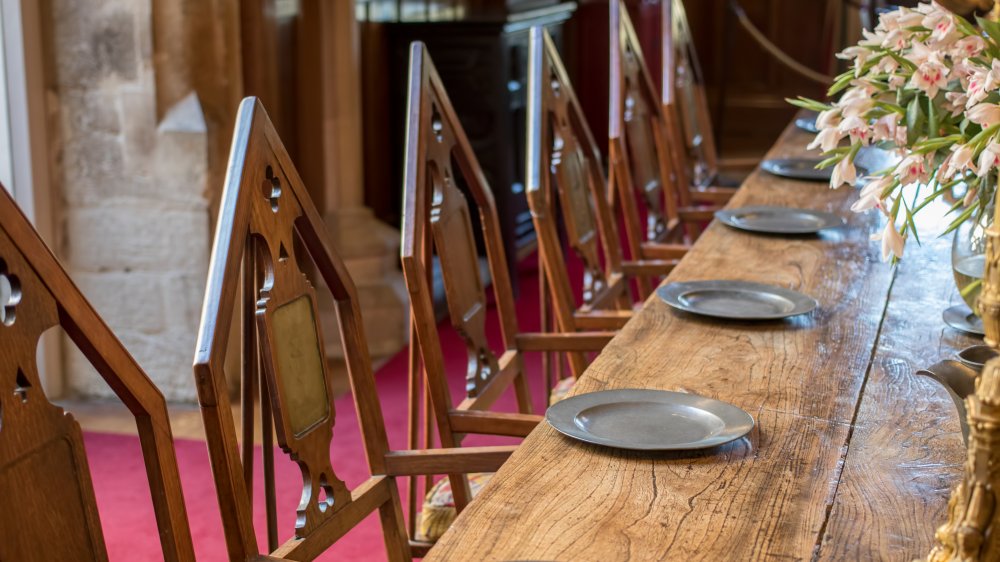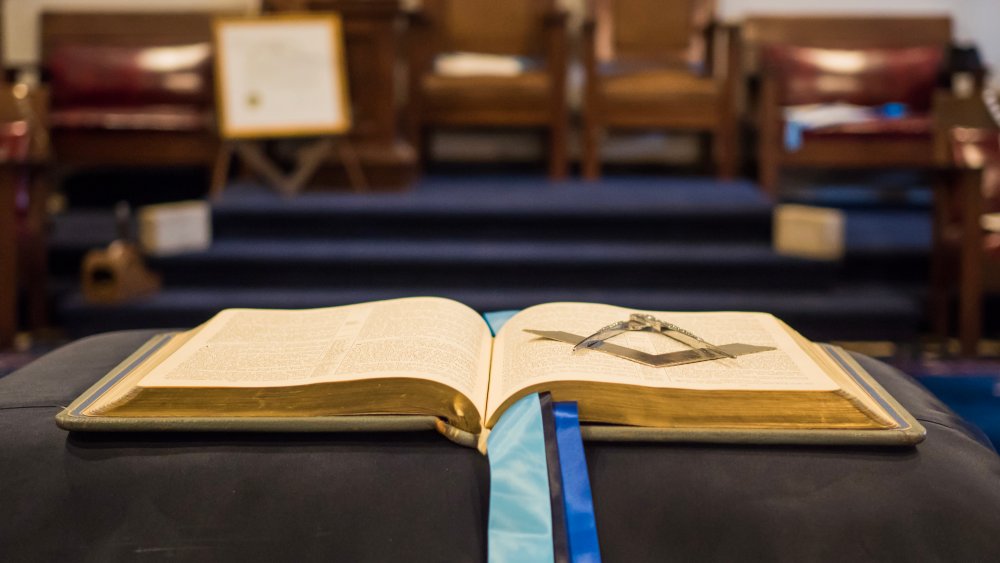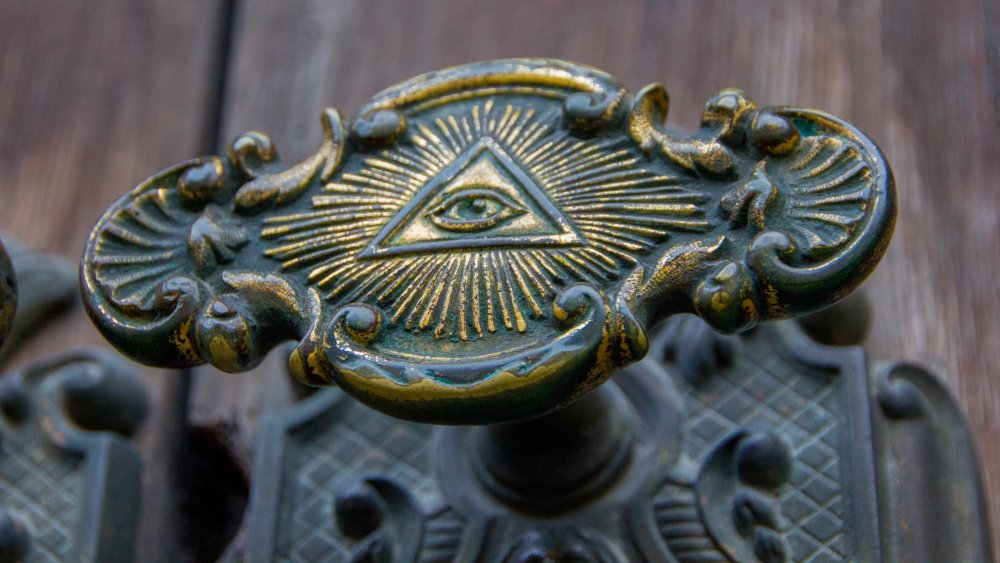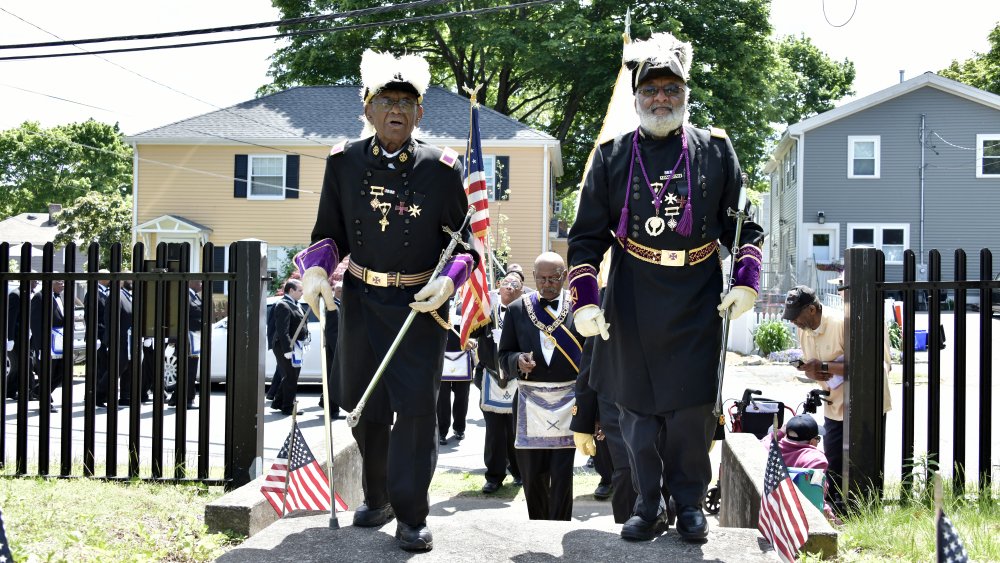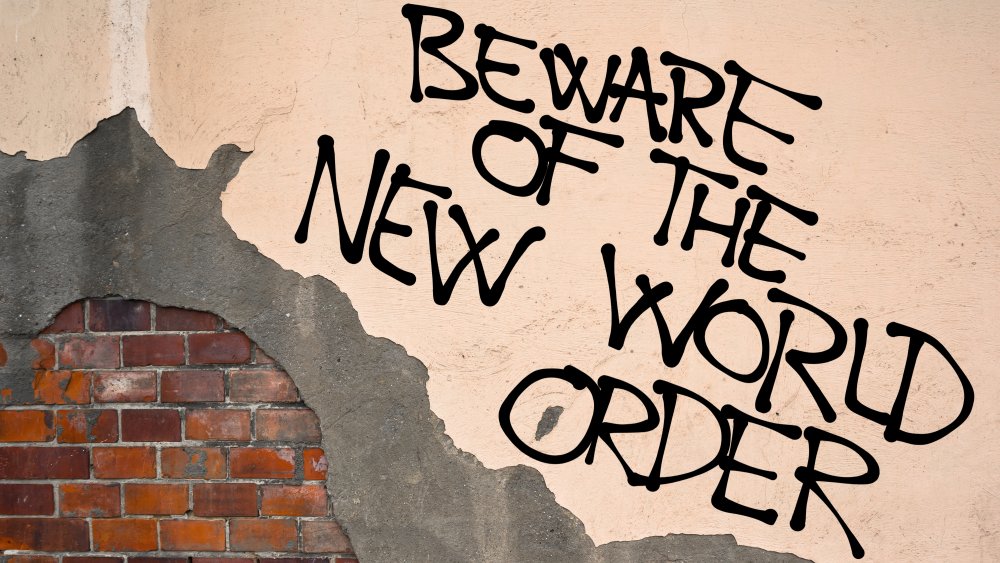What Life Is Really Like As A Freemason
People are pretty worried about secret societies these days, with alleged groups like the Illuminati trying to take over civilization and bizarre conspiracy theories about vast cover-ups of nefarious deeds. But one of the oldest targets of accusations of groups secretly running the world is also one that probably exists openly in your own town.
Freemasonry has a murky history, but it's at least several centuries old, and it claims to be even older than that. And if they're secretly running the world, they must be pretty brazen about it, because everyone has heard of them and they have easily identifiable lodges all over the place. In fact, several famous people from history (including many Founding Fathers of the U.S.) were Freemasons.
But despite their long history and easily provable existence, there's tons of people out there who don't know much about them. But that's because they're super-secret, right? Not so fast...
It's easier to join the Freemasons than you think
According to popular legends, to join the Freemasons, you have to be a descendant of an existing member and be invited via secret messages dropped down your chimney or something once you're rich and powerful enough to join, at which point you go to their secret meeting place.
Except not really. Freemasons actually have open membership, meaning anyone can join regardless of lineage or class (provided they meet a few basic requirements). In fact, a lot of Masonic lodges hold open houses and public events where people can come hang out and see if they're interested in joining up, according to The Atlantic. Freemasons are totally fine with recruiting new people, and often openly and actively seek out new members.
Also, no one gets invited to join the Masons. You have to petition a lodge for membership, meaning you have to do the asking, according to CBS News. As for secret meeting places, as mentioned, lodges aren't really hidden at all. They're usually right on a public street with big Masonic symbols on the building's facade. Many people these days find out about their local ones online or notice the lodge one day and simply ask to join, no ancient bloodline leading back to King Arthur and the Knights of the Round Table (or what have you) required.
There are some basic requirements
But hold on, because there are a few criteria you need to meet, though they're probably far less stringent than you imagine. First of all, you do have to be male, in most cases. Women are not allowed to join the majority of lodges in the U.S., though there are some exceptions. The reasoning behind this? Pretty much there isn't one other than very old (and probably quite sexist in their origin) traditions. It's just been that way for a super long time and Freemasons can be very, very old-fashioned, according to The Atlantic.
The other major requirement is that you must have a religion, or at least proclaim a belief in a higher power of some kind, according to CBS News. In most lodges, it actually doesn't even matter which religion, just so long as you do have one, though some regions are more specific and require members to hold a certain faith. There are actually some completely secular lodges that drop this requirement, but that's a whole 'nother can of worms.
This requirement is sort of weird because Freemasonry is actually not a religious entity at all. Many lodges do have a rule that says that a book of scripture (again, not necessarily any particular religion's scripture) be open during meetings, but that's it. It just has to be open. No one necessarily reads from it or anything.
Nowadays the Freemasons run background checks
If you meet all of the requirements and successfully apply to join a Freemason lodge, then your journey is still not yet over. You also have to provide references, like you're applying for a new apartment or something, so that the lodge can make sure you're not some sort of criminal mastermind, according to The Atlantic. They even do a background check on you to make sure you have a clean record, which is honestly more than some jobs do before hiring.
The lodge has a committee to investigate new applicants. They're not checking to make sure you don't wear socks with sandals (though that could be part of it). What they're actually checking for is making sure you're not some a scammer or crook who might try to take advantage of the lodge or its members for your own personal gain.
Another big thing they check for? Making sure applicants aren't conspiracy weirdos who want to infiltrate the group and reveal their inner workings. As previously mentioned, Freemasons are still frequently accused of being part of some global conspiracy (though that's a less popular theory that it was in the past) so at various times, people have tried to get in under false pretenses and "expose" the goings-on there. While the Freemasons insist that they aren't a secret society, according to CBS News, they do often describe themselves as "a society with secrets."
(Some of) the Freemasons' secrets are revealed
When you join a Freemason lodge, you start as an Apprentice, otherwise known as a first degree Mason, and this is where you begin delving into the secrets that the Freemasons would prefer to keep to themselves. You undergo an initiation rite, and for what it's worth, the Freemasons do say that there is no hazing or violence involved in this or any of their rites. So it's not like a college fraternity initiation. The initiation rite is kept secret from outsiders, and revealing it can get you kicked out of the society, according to The Atlantic.
You're also taught secret handshakes and passwords to identify yourself as an Apprentice to other Freemasons. These are also not meant to be shared. Both the initiation rite and these handshakes and passwords are performed and shared completely from memory, as none of the group's secrets are actually written down anywhere. They've been passed down through the centuries from one generation of Freemasons to the next. The initiation rite has been said to be an allegory for the building of Solomon's temple, according to the BBC, and does involve being blindfolded, but beyond that, it's a mystery (and can slightly vary depending on the lodge).
Once you've been an Apprentice for a while, you can move up in rank to Fellowcraft and finally to Master, also known as second and third degree Freemasonry. These ranks have separate secret initiation rites as well as secret handshakes and passwords.
Their organization is less complicated than you'd expect
There's another way in which Freemasonry can vary depending on the lodge, and that's how many degrees they actually have. Three degrees is the traditional number, but some lodges have more, like Scottish Rite Freemasonry, which has 33 different degrees according to DocumentaryTube. This is made all the more confusing because each degree beyond the third isn't actually a new ranking — those members are still considered Masters, so it's more like a sideways move.
In fact, there's not a ton of consistency among Freemason lodges. Each lodge does report to a grand lodge, according to the Masonic Service Association of North America. These cover a specific geographic region, like a large city or small state. As for what's above that? Well, turns out, there isn't anything above that. Not to say it's a secret. There just isn't any hierarchy above a grand lodge. There's no worldwide lodge they all communicate with or anything like that. Each grand lodge just worries about their own business and that's it.
Each lodge is supposed to follow something called the "landmarks" of Freemasonry, but there's a lot of debate as to what these are exactly, because each grand lodge defines them differently. They're not exactly written down anywhere, they're just traditions passed down through the centuries like a particularly weird game of telephone. It's up to each grand lodge to decide what rules they consider landmarks and how they're implemented.
The rules aren't set in stone
So what happens when two grand lodges disagree? Let's say one imaginary grand lodge says that all Apprentices must wear red during their initiation rite, and a different imaginary grand lodge says they must wear blue. Who's right? The answer depends on which grand lodge you ask. Lodges can be declared regular or irregular, according to Freemasonry Today, but the terms aren't officially defined, and each grand lodge can decide for itself what it feels is regular and irregular. It basically boils down to this: every grand lodge considers itself regular, and any grand lodge that chooses to do things differently runs the risk of being considered irregular.
Grand lodges can choose whether or not to accept another grand lodge, which is called recognition, according to Freemasonry Network. So if two grand lodges agree that Apprentices wear red during initiation, as far as they're concerned, they're regular Freemasonry and recognize one another, while the ones who insist on wearing blue are irregular and not recognized, and vice versa.
But if one grand lodge doesn't recognize another, there's no punishment or anything. At worst, it means their members aren't allowed to visit each others' lodges, and they may be encouraged not to socialize with members of an unrecognized lodge. If Freemasons were secretly ruling the world, the concept of irregular Freemasonry would probably make that very difficult.
Assembly not required
So what do Freemasons actually do? Well, not for-real stonemasonry, for one thing. While the society is allegedly derived from traditions practiced by actual stonemasons centuries ago, there is no need to know how to hew stone or run a quarry or whatever nowadays. According to Freemasons themselves, what they do in an average meeting is surprisingly ordinary, says The Atlantic.
Apparently, they spend a lot of time just talking about ways to be better people and learn various lessons about morality couched in allegories that use stonemasonry for metaphorical purposes, according to CBS News. It's like a self-help group but with a lot of ceremony and pageantry instead of sitting around in folding chairs at the community center. Sadly, it seems there are no extraterrestrials or diabolical schemes being planned out at Freemason meetings.
This is all open information, too. While Freemasons keep their rites and ways of identifying each other secret, the rest is fine for members to talk about. Freemasons actually say that the best way to learn about what goes on at their meetings and what their overall goals are is just to straight up ask a Freemason. That's not as exciting as making stuff up and putting it on your Tumblr, but at least it's more time-effective.
The secret meetings of the Freemasons
Another thing that Freemasons spend a lot of time on is plain old charity, according to the BBC. While it may not be all that jaw-dropping, Freemasons do spend a lot of time donating or running public fundraisers for good causes. You know Shriners, the guys with the fez hats and tiny cars that build hospitals? They're an offshoot of traditional Freemasons. Most Freemasonry lodges have similar goals, though without the odd choices of headwear and transportation.
This, too, is not a secret. So what is an actual Freemason meeting like? More or less the same as any other group. They talk about stuff like paying bills or organizing new events, according to The Atlantic. Once a year they elect new leadership for the lodge. It's not like the Stonecutters episode of The Simpsons, as awesome as that would be. It's like a church group or ordinary club, but every once in a while they get gussied up and put on a show for themselves. It's like drama club in high school but you don't have to beg your friends and family to show up.
Turns out, all the secrecy that Freemasons supposedly have is very limited in scope. In fact, it seems more like a recruiting tactic than anything else. Who doesn't love secrets, and feeling like they belong to something?
The Freemasons aren't political or religious
If Freemasons wanted to control the world via politics or by pushing a certain religion, they'd run into a lot of trouble because one of their own rules is to avoid talk of politics and religion, according to The Atlantic. Basically, their thinking is that those conversations are rarely productive, which, fair enough. That is indeed often the case. If only family Thanksgiving was that easy to handle. No politics, no religion, pass the potatoes.
And yes, it is ironic that many Freemason lodges require you to have a religion and have a rule that a book of scripture must be open during meetings, yet they're not allowed to discuss religion. The idea there is that each member has a higher power they're accountable to, sort of like Alcoholics Anonymous, and the book of scripture is to remind them of that. So, if you have a religion, it will remind you to be a good person, which Freemasons say is what they're really about.
What do Freemasons talk about instead? Literally anything else. Cars, home improvement stores, sports, stuff that most males talk about when they're hanging out with other dudes. According to Freemasons themselves, they primarily talk about bettering themselves and their communities. It sounds like it's basically a church group without the church part.
Which flavor of Freemasonry would you like?
Beyond their small disagreements, there is a much larger schism in Freemasonry. There are the Freemasons of the English-speaking world, who recognize the United Grand Lodge of England (UGLE). These are the Freemasons that require an avowed belief in a higher power, only allow men to join, and do not permit discussion of politics or religion. These also tend to cover the majority of all Freemasons. This is usually called regular Freemasonry, but keep in mind that regular and irregular in Masonic terms are subjective.
On the other side of the split are most European lodges outside of England, which recognize and follow the rules of the Grand Orient de France (GODF). These Freemasons are secular, meaning they don't require the belief in a higher power and still don't permit the discussion of religion. They do allow talk of politics, though. The biggest difference, however, is that women are allowed to join. These lodges ("orient" is just another name for a lodge) are referred to as continental or liberal Freemasonry, according to Freemasonry Network.
Naturally, each side of the schism argues that its side is regular and the other irregular, and neither side recognizes the other, meaning that members are not free to go between their lodges. Most Freemasons around the world recognize one side or the other, but there are a few independent lodges out there or smaller branches of Freemasonry.
The good ol' boys club
It's time to talk about something very uncomfortable in the Masonic world — how wildly racist the society has been. Essentially, Black people (as well as other people of color) were not allowed to join most lodges for centuries. While this was primarily an issue with American lodges, it's certainly not exclusive to them.
This actually goes all the way back to America's founding when Prince Hall founded a lodge specifically for Black men to become Freemasons. This was horribly controversial for the time, so Black lodges (called Prince Hall lodges) mostly kept to themselves. White lodges universally didn't recognize Black lodges for a very embarrassingly long time, and UGLE-following Freemasons and Prince Hall Freemasons are actually still largely segregated according to NBC News, though things have changed a bit in recent decades: Most states' grand lodges do now recognize Prince Hall lodges, and there are many UGLE grand lodges that do allow people of color to join.
But there are still grand lodges in a dozen states, primarily in the southern U.S., that still refuse to recognize Black Freemasons today, in the 2020s. Yes, seriously. In 2009, Freemasons in Georgia went to court after a Black man named Victor Marshall graduated to the rank of Master, according to the New York Times. Leaders of other Georgia lodges found out about this, then tried (and failed) to revoke the charter of the lodge where Marshall was a member.
The Freemasonry network
One of the biggest rumors about the Freemasons, besides the whole "controlling the world" thing, which seems pretty unlikely, is that they have a secret network of Masons helping each other out and unfairly giving people in the society advantages that regular people don't get. These claims of rampant nepotism are so prevalent that lodges actually have specific rules against it, according to the BBC. A member is never supposed to use their Freemasonry connections for their own personal gain.
Does that mean it never happens? No, of course not, but doing so does run the risk of you getting kicked out of the group. Basically, according to Masons themselves, nepotism runs counter to their goals of charity and bettering oneself. Their philosophy on the matter is to instead use members' connections and advantages to better give aid to charity groups. That's not to say that Freemasons might not go the extra mile to help out a fellow member, just that they're prohibited from blatant favoritism.
And of course, rumors of Freemasons using their combined political power to influence things still come up all the time, according to The Guardian. There have been numerous points in history where people have noted unusual, possibly criminal circumstances surrounding various lodges, but to date, none have been proven to actually result in any wrongdoing. The Freemasons, for their part, deny everything, but depending on how paranoid you are, that might not mean much.
